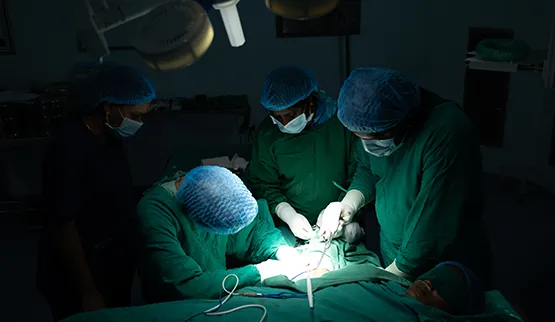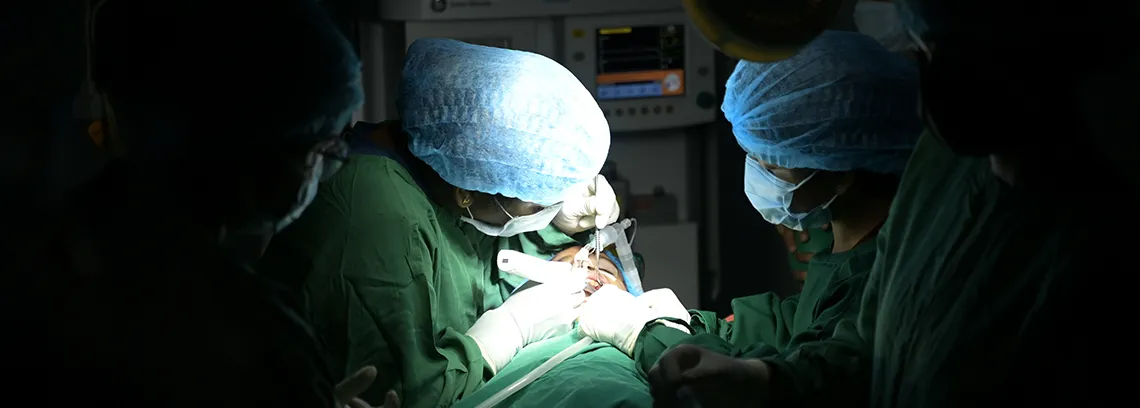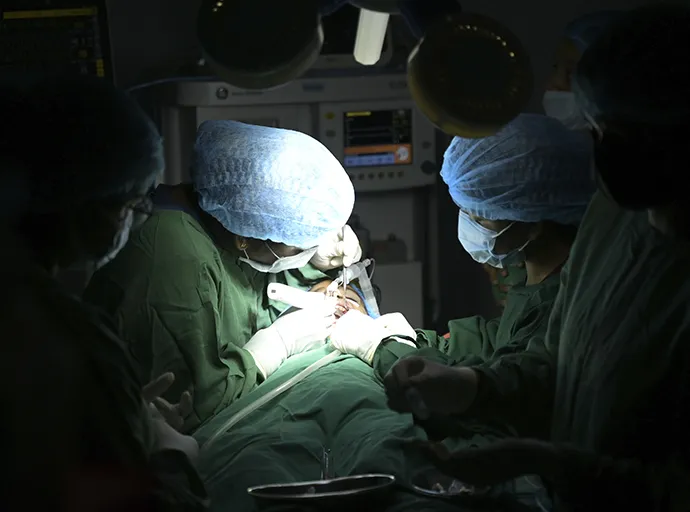Master of Surgery in General Surgery
The Master of Surgery in General Surgery (MS General Surgery) is a three-year post-graduate programme essential for individuals aspiring to become surgeons in India. This comprehensive course equips candidates with the advanced knowledge and practical skills required in the field of surgery.
To be eligible for admission to the MS General Surgery programme, candidates must possess a Bachelor of Medicine, Bachelor of Surgery (MBBS) degree and complete a minimum one-year internship. This foundational training ensures that prospective surgeons are well-prepared for the rigorous demands of surgical practice.

Eligibility
- MBBS Degree from an institution recognized by the NMC.
- Candidates must have qualified for the NEET PG exam.
- Internship completion and registration with the State Medical Council are mandatory prerequisites.
Scope of the Programme
The scope of General Surgery is extensive, with numerous hospitals and medical institutes being constructed to address the rising health concerns across the country. This expansion reflects a growing demand for surgical services, highlighting the critical role that general surgeons play in the healthcare system.
As a result of this increasing need, there is a heightened demand for highly qualified medical professionals, particularly general surgeons, both in India and internationally. This trend not only offers a wealth of opportunities for new graduates but also underscores the importance of skilled surgical practitioners in ensuring the efficient functioning of healthcare facilities.
Key Highlights
Application Domain Experience of Faculty
- Faculty members possess extensive clinical and academic backgrounds in respiratory medicine.
- Mentorship is provided for both clinical and research endeavors.
Infrastructure
- State-of-the-art facilities for advanced respiratory care.
- Access to modern diagnostic tools and therapeutic equipment, including bronchoscopy and pulmonary function testing.
Areas of Excellence
- Focus on critical care and interventions for respiratory diseases.
- Backed by NABH-accredited hospital facilities and advanced diagnostic capabilities.
Practical Exposure
- Extensive clinical training in diverse settings.
- Hands-on experience with procedures like thoracoscopy and bronchoscopy.
Hospitals & Academic Collaborations
- Strong partnerships with local hospitals, including the Vizag Government Chest and TB Hospital.
- Opportunities for real-world experience through the District Residency Program.
Institutional Social Responsibility
- Emphasis on community engagement initiatives.
- Public health education and outreach programs to promote healthcare awareness.
Syllabus
Competency-Based Medical Education (CBME) as directed by the National Medical Commission.
Standard Track offerings of courses
- Physiology
- Microbiology
- Ophthalmology
- Anatomy
- Pathology
- ENT
- Biochemistry
- Pharmacology
- General Medicine
- Yoga and Meditation
- Forensic Medicine & Toxicology
- Community Medicine
- General Surgery & Orthopaedics
- Pediatrics
- Obstetrics & Gynecology
The curriculum follows the National Medical Commission (NMC) guidelines, focusing on the following key areas:
- Pulmonary function tests and diagnostic methods.
- Treatment and management of tuberculosis, asthma, COPD, and interstitial lung diseases.
- Ventilator management, ICU care, and critical care procedures.
- Diagnostic bronchoscopy, interventional pulmonology, and thoracoscopy.
- Training in medical research methodology, ethics, and evidence-based medicine.
- Seminars, journal clubs, case discussions, and conferences.
- Practical clinical skills development through rotations in outpatient departments, ICUs, and other settings.
Career Options
The growth of the Indian healthcare sector, projected to reach US$300 billion by FY 2025, presents numerous career opportunities for those pursuing a Master of Surgery in General Surgery (MS General Surgery). With approximately 70% of healthcare spending allocated to in-patient care—amounting to US$105 billion—there is a significant emphasis on surgical interventions. Currently, around 30 million surgical procedures are performed annually in India, with over 70% of these taking place in smaller and mid-sized hospitals. This trend underscores the pressing demand for skilled surgeons in various settings, making a career in general surgery both rewarding and impactful.
After completing an MS in General Surgery, graduates can explore diverse career paths, including clinical roles in hospitals, academic positions, and opportunities in surgical research. Given that an estimated 50 million surgeries are needed annually in India, there is a substantial demand for general surgeons to meet this need, particularly for the age group of 30–49 years, which accounts for one-third of the required procedures. Surgeons may also specialise in various fields, such as trauma surgery, paediatric surgery, or bariatric surgery, further enhancing their career prospects. Additionally, as the healthcare infrastructure expands, opportunities for leadership roles in hospital management, surgical training programmes, and public health initiatives will become increasingly available, providing a dynamic and fulfilling career landscape for MS General Surgery graduates.
Graduates from this programme can pursue careers in various sectors such as:
- Neurosurgeon
- Endocrine Surgeon
- Vascular Surgeon
- Urologists
- Plastic and Reconstructive Surgeon
- Ophthalmologist
Infrastructure That Empowers Medical Excellence















Fee Structure
MS (General Surgery)
Scholarships
Merit-Based Scholarships
The scholarship from GAT/National/State Entrance Tests applies only in the first year. To continue receiving it in subsequent years, a minimum CGPA of 8.0 must be maintained.
Apart from the above, the following scholarships are also offered to eligible students.
- Employee Children Scholarships: (60%, 40%, and 20%)
- Loyalty Scholarships: (10% for Any alumni returning to do higher studies/Children of Alumni/Real siblings (Not applicable to step siblings or cousins)/Children of retired employees of GITAM/Spouse of GITAM employees).
- Sports Scholarships: (100%, 75%, 50%, 25% and 15%)
Need-Based Scholarships
- To be eligible for the need-based scholarship, the combined income of both parents/guardians of the eligible student/If the student is married, the combined income of the family, i.e., the student's and spouse's income, must be less than 12.00 LPA.
- The candidates admitted through merit scholarship in the slabs of 75%, 60%, 40%, 25%,and 15%, and the parents/guardians combined income is less than the prescribed limits are eligible for the additional need-based scholarship.
| Scholarship % | Upgraded Scholarship % |
|---|---|
| 75% | 100% |
| 60% | 75% |
| 40% | 60% |
| 25% | 40% |
| 15% | 25% |
Scholarships For Accommodation
- In addition, students awarded need-based scholarships after merit scholarships will receive an additional 20% scholarship specifically allocated for hostel fees at GITAM for slabs: 15%, 25%, 40%, and 60%.
- Students awarded 75% & 100% scholarships are also awarded the same percentage in the hostel and food charges.
Scholarship Percentage
100%
Eligibility for 2025
GAT 2025 Score >=141 <=200
GPAT Rank >=1 <=500
AP PGCET 2025 Marks >=110 <=120
TS CPGET 2025 Marks >=95 <=100
Scholarship Percentage
75%
Eligibility for 2025
GAT 2025 Score >=121 <=140
GPAT Rank >=501 <=1000
AP PGCET 2025 Marks >=100 <=109
TS CPGET 2025 Marks >=85 <=94
Scholarship Percentage
60%
Eligibility for 2025
GAT 2025 Score >=111 <=120
GPAT Rank >=1001 <=2000
AP PGCET 2025 Marks >=90 <=99
TS CPGET 2025 Marks >=80 <=84
Scholarship Percentage
40%
Eligibility for 2025
GAT 2025 Score >=101 <=110
GPAT Rank >=2001 <=3000
AP PGCET 2025 Marks >=80 <=89
TS CPGET 2025 Marks >=75 <=79
Scholarship Percentage
25%
Eligibility for 2025
GAT 2025 Score >=91 <=100
GPAT Rank >=3001 <=4000
AP PGCET 2025 Marks >=70 <=79
TS CPGET 2025 Marks >=65 <=74
Scholarship Percentage
15%
Eligibility for 2025
GAT 2025 Score >=81 <=90
GPAT Rank >=4001 <=6000
AP PGCET 2025 Marks >=55 <=69
TS CPGET 2025 Marks >=50 <=64








